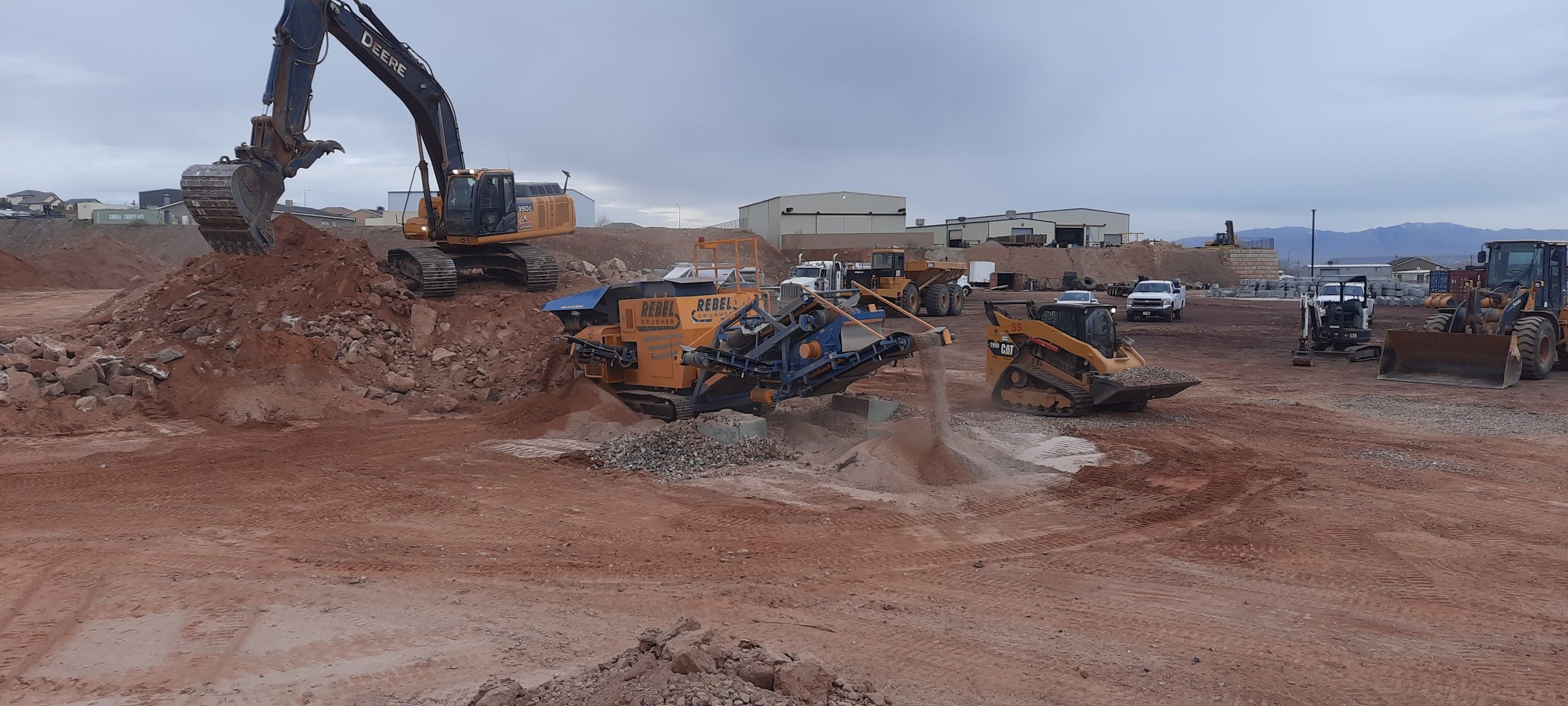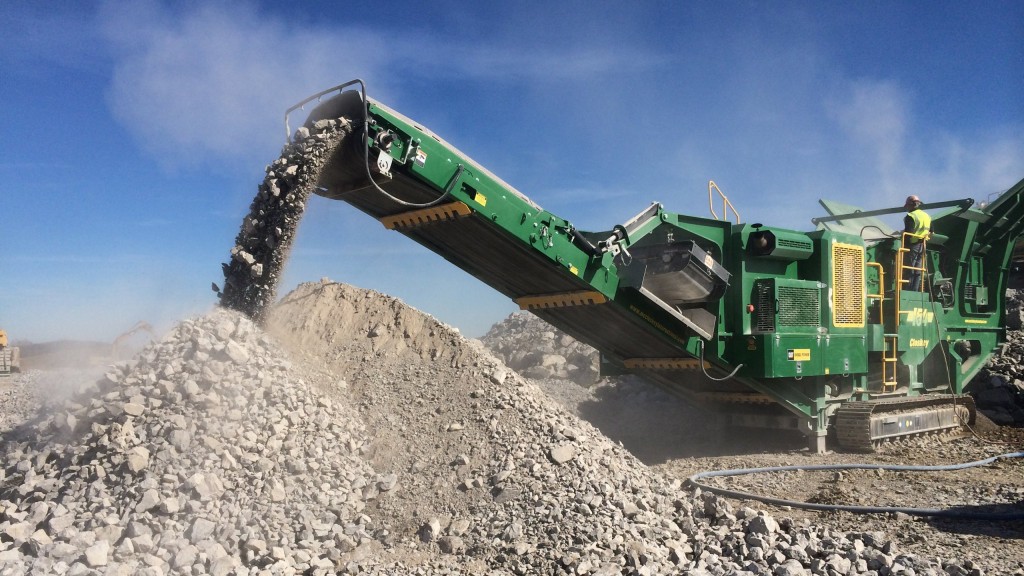Breaking Ground: Your Comprehensive Overview to Concrete Crusher for Sale
Making The Most Of Sustainability: The Function of Concrete Crushers in Recycling
Concrete waste is a prevalent environmental worry, with the building sector being one of the largest contributors to international carbon emissions. Nevertheless, amidst this difficulty exists a promising service: the duty of concrete crushers in reusing. These innovative devices have emerged as a vital gamer in taking full advantage of sustainability by changing thrown out concrete into important resources. By harnessing the power of advanced innovation, concrete crushers provide a myriad of advantages that not just lower waste but also preserve natural deposits and reduce the environmental effect of building and construction tasks. In this conversation, we will certainly explore exactly how concrete crushers work, highlight the advantages of recycling concrete, showcase successful study, and give a glimpse into the future of this evolving field. Join us as we unravel the untapped potential of concrete crushers, and discover the path towards a greener and more sustainable future.
The Environmental Influence of Concrete Waste
The ecological effect of concrete waste is a significant problem in the world of recycling and lasting building practices. Concrete is just one of one of the most widely made use of building products because of its strength and longevity. Its production and disposal contribute to various environmental problems. The extraction of raw materials, such as sedimentary rock and clay, for concrete production leads to environment devastation and biodiversity loss. Furthermore, the manufacturing procedure itself is energy-intensive and releases a considerable amount of carbon dioxide right into the atmosphere, adding to climate change.
The disposal of concrete waste likewise presents ecological obstacles. When concrete is knocked down or gotten rid of from construction websites, it is often sent to landfills, using up beneficial space and generating greenhouse gas emissions as it decomposes. The inappropriate disposal of concrete waste can infect soil and water sources, impacting ecological communities and human wellness.
Concrete crushers play a critical function in this process by damaging down concrete waste into smaller, multiple-use particles. Reusing concrete waste not only preserves natural sources yet likewise reduces carbon discharges associated with concrete manufacturing.
How Concrete Crushers Work
Concrete crushers are effective devices developed to damage down concrete waste into smaller sized particles for reusing purposes. These makers make use of hydraulic pressure and huge jaws to put in pressure on concrete waste, crushing it into smaller sized pieces that can be reused as accumulations in new construction tasks.
The process of exactly how concrete crushers work begins with the feeding of the concrete waste into the crusher's receptacle. The hopper, which is commonly geared up with a vibrating feeder, makes sure a consistent and even circulation of material right into the crusher.
As soon as inside the crusher, the concrete waste goes through the squashing activity of the machine's jaws. These jaws, which are usually constructed from durable and strong materials like manganese steel, put in significant force on the concrete waste, simplifying into smaller, extra manageable pieces.
The crushed concrete waste then goes through a collection of displays or filters, which arrange the aggregate by size (concrete crusher for sale). This permits the splitting up of bigger items that might require additional squashing from smaller, ready-to-use aggregates

Advantages of Recycling Concrete With Crushers
Reusing concrete waste with the assistance of crushers uses countless advantages towards sustainable construction practices and source preservation. Among the vital advantages of reusing concrete is that it assists decrease the need for new building and construction products. By utilizing smashed concrete as a replacement for all-natural accumulations, such as gravel and sand, we can reduce the need for quarrying and mining activities. This, subsequently, aids save natural deposits and reduces the ecological effect associated with extracting and refining virgin materials.
An additional significant benefit of reusing concrete is the reduction in landfill waste. Concrete waste takes up a substantial amount of room in landfills, and its disposal can add to pollution and greenhouse gas exhausts. concrete crusher for sale. By recycling concrete, we can divert this waste from land fills and decrease the pressure on these already limited sources. Furthermore, reusing concrete can help in reducing transportation prices and carbon discharges connected with hauling waste product to land fills.
In addition, using recycled concrete can result in set you back financial savings in construction jobs. Squashed concrete is typically much less expensive than utilizing brand-new products, making it an attractive option for contractors and designers. Reusing concrete can additionally add to LEED (Management in Power and Environmental Layout) certification, which is a widely acknowledged requirement for lasting structure methods.
Study: Successful Concrete Recycling Projects
Numerous remarkable study exhibit the success of concrete reusing jobs in different building and construction and framework growths. One such study is the Central Artery/Tunnel Task, additionally referred to as the "Huge Dig," in Boston, Massachusetts. The job involved the construction of a new below ground freeway system, which called for the demolition of existing concrete frameworks. By carrying out a concrete crusher on-site, the job was able to reuse and recycle around 98% of the knocked down concrete, leading to considerable cost financial savings and lowered ecological effect.
An additional successful situation study is the Sydney City Northwest project in Australia. This significant click facilities growth included the construction of a brand-new city rail line. To reduce the job's carbon footprint and advertise sustainability, concrete crushers were used to reuse the demolished concrete from old structures and frameworks. This method not just conserved garbage dump room however additionally resulted in significant material cost savings and minimized transport expenses.
Furthermore, the Los Angeles International Flight Terminal (LAX) development job included concrete recycling as a key element of its sustainability campaigns. By using discover this crushers to process and reuse the knocked down concrete, the task was able to divert hundreds of loads of waste from garbage dumps and lower the need for virgin aggregate. This not only reduced ecological influence but likewise assisted the task attain LEED certification.
These study demonstrate the efficiency of concrete crushers in making the most of sustainability and promoting the circular economy in building and infrastructure jobs. By welcoming concrete recycling, programmers can minimize waste, conserve sources, and add to an extra lasting future.
Future Technologies in Concrete Crushing Modern Technology

One of the future developments in concrete crushing technology is the growth of robot crushers. These crushers will be equipped with advanced sensing units and expert system capacities, enabling them to autonomously identify and divide various materials in knocked down concrete. This will dramatically minimize the need for hands-on sorting, saving time and sources.
One more area of development is using sophisticated crushing strategies that can extract a greater portion of aggregates from knocked down concrete. Currently, a substantial amount of aggregates are lost throughout the crushing process. However, with the growth of new squashing innovations, it is prepared for that the healing price of aggregates will certainly raise, leading to an extra sustainable and reliable recycling procedure.
In addition, researchers are checking out using alternative energy go to this website resources to power concrete crushers. By utilizing renewable resource, such as solar or wind power, the carbon impact of the crushing process can be more reduced, contributing to a greener and a lot more lasting construction market.
Verdict
In final thought, concrete crushers play a vital role in making best use of sustainability via the recycling of concrete waste. By lowering the ecological influence of concrete waste and advertising the reuse of products, crushers contribute to a much more sustainable construction industry.
Concrete crushers play an important function in this process by breaking down concrete waste right into smaller sized, recyclable bits. Recycling concrete waste not only preserves natural resources yet additionally minimizes carbon discharges associated with concrete manufacturing.
By applying a concrete crusher on-site, the task was able to recycle and reuse approximately 98% of the demolished concrete, resulting in substantial expense savings and reduced ecological effect.
To decrease the project's carbon impact and promote sustainability, concrete crushers were used to reuse the destroyed concrete from old buildings and frameworks (concrete crusher for sale).In final thought, concrete crushers play an essential role in making best use of sustainability with the recycling of concrete waste